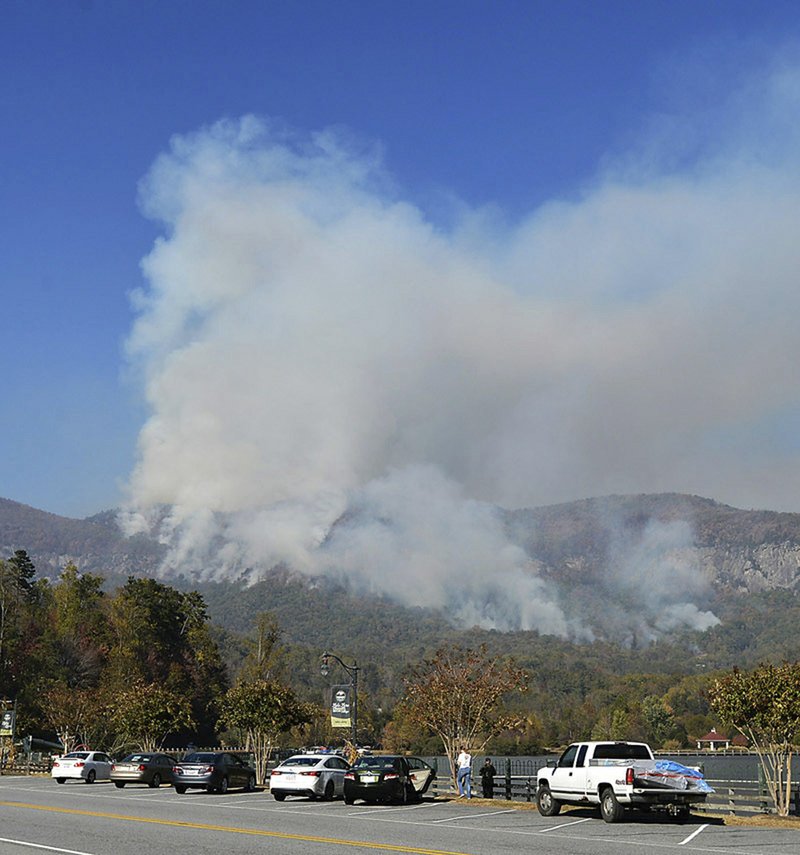ATLANTA -- The search is on for a man in a dark-blue SUV last seen where a handful of fires began in Georgia. Authorities in North Carolina suspect arson in more than 20 wildfires burning in a national forest. And in Kentucky, a wannabe weatherman faces an arson charge after police said he admitted starting a fire to draw attention to his Facebook selfie videos.
"It's really too bad because he's not a bad kid -- he's just misguided," Jenkins Police Chief James Stephens said Friday after Johnny Mullins, 21, was jailed this week on a second-degree arson charge.
"He likes to do Facebook videos and have people follow him on his 'weather forecast,' so that's pretty much why he did what he did," the chief said. "He enjoyed the attention he got from the Facebook stuff."
"He didn't realize how much danger he was putting other people in," Stephens added.
No arrests were announced in most of the rest of the suspicious fires, which have been torching forests in and around the southern Appalachian mountains. The drought across much of the South has removed the usual humidity and sucked wells and streams dry, making the woods ripe for fire.
Tens of thousands of acres have burned, and about a dozen of the largest fires remain uncontained and have forced many people to evacuate their homes ahead of fast-moving flames.
Law officers in Georgia's Rabun County suspect that someone started a series of small roadside fires Wednesday that eventually merged into the much larger blazes firefighters were working to contain on Friday, said Justin Upchurch, the county's assistant fire chief.
The Rabun County sheriff's office urged people to be on the look-out, saying the SUV was last seen in the area of the fires. The office was more emphatic in a separate Facebook post, asking residents to spread the word "and help us lock this criminal up!!!"
The area is less than 50 miles from North Carolina's Nantahala National Forest, where more than 20 wildfires that have burned more than 17,000 acres are all "being investigated for suspected arson," forestry officials announced in a status update.
There were 14 other wildfires burning on Cherokee Nation land in North Carolina, all under investigation by local law enforcement. A fire managers' update noted that the U.S. Bureau of Indian Affairs is seeking information about fires on Indian lands through an arson hotline.
States of emergency were declared in some of the affected areas to facilitate state and federal spending on the response.
More than 5,000 firefighters and support staff from around the nation have joined the effort, said Shardul Raval, director of fire and aviation management for the southern region of the U.S. Forest Service. About 40 aircraft are involved, including three large air tankers flying out of Chattanooga, Tenn.
The national drought report shows 41.6 million people in parts of 15 Southern states, including Arkansas, living in drought conditions. The worst is in Alabama, Georgia, Mississippi and Tennessee, but extreme drought also is spreading into the western Carolinas. Kentucky, North Carolina and Tennessee all have fierce fires.
One of the largest blazes was spreading rapidly in the Cohutta Wilderness area just south of the Georgia-Tennessee line. Nearly 300 people are battling that fire, which already consumed about 15 square miles, the Forest Service said.
Smoke from the fires has made North Carolina's largest city a Code Orange zone for air quality, meaning anyone with breathing problems could suffer. The Charlotte Observer reports that the heavy haze and smoky conditions should make people limit outdoor activities.
Information for this article was contributed by Martha Waggoner, Tom Foreman Jr. and Jonathan Mattise of The Associated Press.
A Section on 11/12/2016
